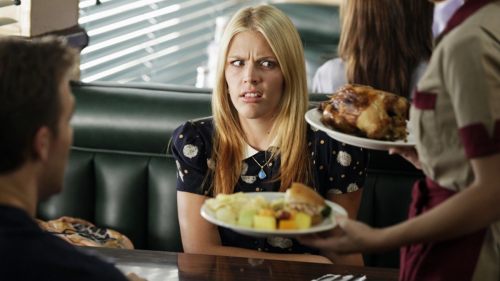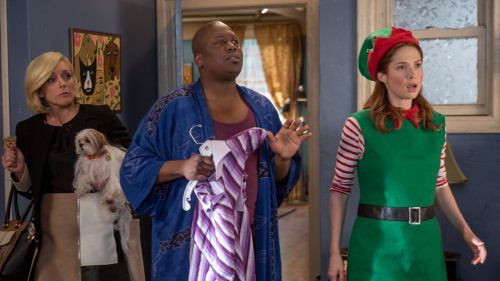WHISKEY TANGO FOXTROT Review: Top Tier Tina Fey
Whiskey Tango Foxtrot has a difficult job to do, maybe even an ill-conceived job: it’s meant to be an empowering romantic comedy (already a difficult task) on top of a war-time drama. That it succeeds is thanks to Tina Fey, who gives a nuanced performance in a film otherwise without nuance. She’s so good that you can forget that Whiskey Tango Foxtrot is a bit mediocre and myopic. Hers is the kind of performance that elevates a movie based solely on her own strength, and it’s because of Fey that I walked out of Whiskey Tango Foxtrot a fan of the film.
The script is written by frequent Fey collaborator Robert Carlock, based on the book by war correspondent Kim Barker (Fey’s character is named Kim Baker here, likely to differentiate the fictional woman from the very real one). It’s funny, if rather tidy in the midst of such a messy story, and it’s competently, if not remarkably, directed by Glenn Ficarra and John Requa. That’s a lot of men telling a woman’s story, but it’s to Whiskey Tango Foxtrot’s credit that it never feels like it. Or more specifically, it’s to Fey’s credit, because her Kim Baker is so present, so tangible, that it wouldn’t be impossible to believe that Fey created the character herself.
Of course, Fey is a producer on the film, based on Barker’s humorous memoirs The Taliban Shuffle: Strange Days in Afghanistan and Pakistan. And it’s easy to see why the actress would want to take on this role, as it’s a perfect balance of Fey’s innate comedic genius met with a newly dramatic challenge she’s likely been hankering to tackle. And it’s in that dramatic arena that Fey really surprises: Baker’s goofier moments have a tinge of Liz Lemon to them (and, though familiar, those glimpses are always welcome), but when Baker is struggling with the morality of this war and her position in it, when she’s rudderless and seeking direction, when she must resort to extreme measures to get her story or save her friends, we see a wealth of strength in Fey, the sort of insight and wisdom that has, until now, been saved for her writing rather than her perfectly silly performances. That’s not to say that dramatic acting is harder than comedy – in fact, I’d argue that the opposite is true – but Fey’s already conquered the world of comedy. Whiskey Tango Foxtrot is an ideal bridge between the two genres, proving without question that she can do both – often in the same moment.
Baker is a copyeditor for a cable news station. She sits in a cubicle taking women’s one-a-day vitamins while typing out words other people will say on camera, and then she leaves work to water her plants, ride countless miles on her gym’s stationary bike and tend to a lukewarm relationship with her boyfriend (Josh Charles). When a producer for the station gathers all of the “unmarried, childless personnel” in a plea for more war correspondents to cover the endless news coming out of Afghanistan at the time (2003), Baker finds herself saying yes. “I guess…I’m a war reporter now,” she tells Charles over the phone.
She’s thrown into the deep end at once, learning her first day that her hair is wrong, her backpack is wrong, the way she holds money and communicates with the Afghan people and talks to her military liaison is wrong. But though this fish out of water routine is amusing for a time, Whiskey Tango Foxtrot dispenses with it pretty quickly. Kim Baker is no schmuck. She was meant to do this. At the first sign of combat, she ignores orders to stay in the van, grabs a camera and runs directly toward trouble. She has an instinct for storytelling and a personal charisma that endears her to everyone and helps her to realize that she’s damn good at this job.
It’s not all bombs and dust. Baker and her colleagues refer to their station in Kabul as the “Kabubble,” or what Barker calls “Kabul High” in her memoirs. The reporters and soldiers counter the solemnity of their responsibilities by being extremely irresponsible every night. Drugs, parties, sex and an inordinate amount of drinking fill Baker’s evenings, and she quickly learns how to execute an important interview with a miserable hangover. She’s told by multiple people that though she’s somewhere between a 4 and a 7 back home (depending on who she’s talking to), she’s a 9 or a 10 in Kabul, and she doesn’t seem to mind the attention. Kabul feels like a strange dream to this once-imagined cubicle lifer: here she’s the popular girl at the wild party, but more than that, she’s an accomplished professional, and a daring journalist. She’s doing something that matters and exhibiting great courage and competence as she does so…but the nature of the Kabubble is that it allows Baker to lose her grip on some bigger, more important questions in the meantime.
Although wry, liberated Fey is the medalist here, she’s not alone in giving a great performance. Margot Robbie plays veteran reporter Tanya Vanderpoel, a correspondent Baker long admired before meeting and befriending her in Kabul. Vanderpoel is brash and thoughtless and impossibly gorgeous, but Robbie gives her a believable humanity. Billy Bob Thornton is General Hollanek, the Marine officer overseeing Baker’s stint, and his brusque military protocol soon warms and relaxes to Baker’s undeniable appeal. He likes her and respects her, because no one could help but like and respect Kim Baker.
Two other performances in the film are both laudable and misguided. Alfred Molina is Attorney General Ali Massoud Sadiq, and it’s Alfred Molina, so of course he’s terrific. He has an absurd crush on Baker and attempts to do something between wooing her and extorting sex from her, and Baker’s responses are always satisfying. But why not cast a native speaker in this role, or more importantly, in the role of Fahim Ahmadzai, Baker’s Afghan fixer, based on Barker’s real-life fixer and friend Farouq Samim. Fahim is played by Girls’ Christopher Abbott, and the thing is, he’s great. Fahim emanates kindness and good sense, a consistently grounded presence necessary as Baker finds herself surrendering to the crazier and more dangerous aspects of life in the Kabubble. But this is a vital role, one that is an attempt to keep the Afghans from feeling like an “other” in this story, a “them” to the us of Baker and Vanderpoel and Hollanek. Casting an Afghan in that role, or at least a person of Middle Eastern descent, would add some necessary weight to that statement, an immediacy that is missing when Fahim’s performer is best known for playing a Brooklyn hipster, regardless of talent.
And then there’s Martin Freeman as Iain MacKelpie, the Scottish photographer and bona fide scoundrel with whom Baker embarks on a tempestuous romance. He’s funny and roguishly charming, a perfect foil for Fey’s deeply unimpressed Baker. But honestly, why is there a romance in this movie at all? Or at least one that becomes the focal point two-thirds of the way through the film, when we thought we already knew what this movie was about? It adds an arbitrary element to an already unfocused film. On one hand, Baker’s love story with MacKelpie does Whiskey Tango Foxtrot no favors. On the other hand, how can two hilarious actors doing their best work off each other be anything but a boon?
That’s how much of Whiskey Tango Foxtrot feels: each element, on its own, is successful, and in the case of Fey, tremendously so. But the whole never gels, making the film a pleasant diversion instead of a memorable experience. If it weren’t for a brilliant lead performance, Whiskey Tango Foxtrot would be a failure, but – and this isn’t the first time I’ve said this, and it likely won’t be the last – thank Christ for Tina Fey.



